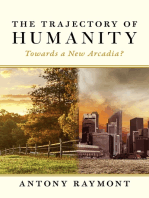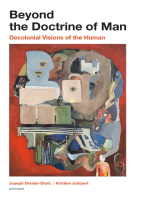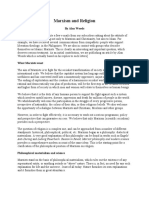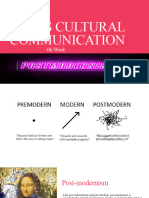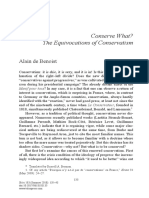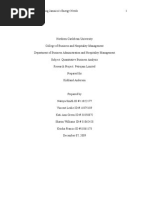Toward A Person-Centered Society - DR. STAVROS S. FOTIOU
Toward A Person-Centered Society - DR. STAVROS S. FOTIOU
Uploaded by
Saittam WourCopyright:
Available Formats
Toward A Person-Centered Society - DR. STAVROS S. FOTIOU
Toward A Person-Centered Society - DR. STAVROS S. FOTIOU
Uploaded by
Saittam WourOriginal Title
Copyright
Available Formats
Share this document
Did you find this document useful?
Is this content inappropriate?
Copyright:
Available Formats
Toward A Person-Centered Society - DR. STAVROS S. FOTIOU
Toward A Person-Centered Society - DR. STAVROS S. FOTIOU
Uploaded by
Saittam WourCopyright:
Available Formats
THE GREEK ORTHODOX THEOLOGICAL REVIEW
Vol. 45, Nos. 1-4, 2000
Toward a Person-Centered Society: The
Great Challenge of the 21st Century
DR. STAVROS S. FOTIOU
THE INDIVIDUAL-CENTERED WORLD AT AN IMPASSE
We live in a world that is tragically irrational and irrationally tragic:
a world of hunger in the midst of mass consumption and of loneliness
in the midst of mass culture; a world of violence and alienation; a
world where some lack bread, others freedom, and others a meaningful
way of life.
The entire world is undergoing a crisis today, a crisis in the modern
way of life, that is to say, in the worldview that developed during the
enlightenment, based upon the epistemological foundations of
classical or Newtonian physics. The two principal features of this
worldview are dualism and individualism. E)ualism understands the
three elements of the ontological triad God-man-world as having
adversarial relationships with each other. It thus confines life to a
series of Manichean oppositions: man versus God, man versus his
fellow man, and man versus nature. Individualism sees man first and
foremost as an individual, a self-contained entity turned in upon itself,
separate units to be quantified statistically and mobilized en masse.
Dualism and individualism see individuals as being in discord and
conflict with each other: the living space of one threatens the living
space of another, and the freedom of one limits the freedom of another.
This individual-centered conception of man gave rise to analogous
sociological conceptions, which attempted to justify its egocentrism
and inhumanity. Biological Darwinism developed into social
Darwinism, and Friedrich Nietzsche took evolution one-step further:
583
584
The Greek Orthodox Theological Review: 45/1-4, 2000
since man evolved from apes, why not start with man and reach
superman?
The entire world was thus transformed into a battlefield where the
various parts, by definition opposed and hostile to each other, contend.
The nature of man and human life is seen as being in continuous
conflict, both internally and externally: internally, the body vies with
the soul, logic with feeling, and the conscious mind with the
unconscious mind; externally we find male pitted against female,
German against Frenchman, white against black, bourgeois against
worker, and European against African.
Society attempts to limit this conflict and struggle between
individuals by enacting laws and establishing barriers that restrain
unbridled egocentrism. The goal is for individuals to coexist
peacefully, to survive in tandem. As a result, society is nothing more
than a "social contract" whose role consists merely in balancing rights
and obligations.
With the rise of this modern worldview, knowledge became
identified with power; having knowledge meant conquering,
subjugating the known object to one's will. For this reason modern
man narrowed his concept of existence to what was quantitative and
measurable, tangible and rationalistic, relegating metaphysical,
internal, and qualitative matters -futile questions, in his opinion- to
be left to the so-called theoretical sciences. Science, thus demoted,
became a utilitarian tool, valuable only insofar as it could be used as
an instrument for supremacy and domination.
Nature was regarded through this same lens. In his arrogance,
modem man saw the natural environment as nothing more than an
enormous mine he could exploit indefinitely. Nature was
counterpoised to humanity; it was viewed as an inanimate thing to be
used and abused, possessed and dominated. In England, Bacon
described nature as a slave that man must subjugate; in France,
Descartes sought to conquer it; and in Germany, Kant likened nature
to the object of an interrogation whose interrogator must resort to
torture in order to extract hidden secrets.
This dualistic juxtaposition of man and nature, this view of man as
the only subject and of nature as the object, led to the belief that man
is the only first principle and to all the negative consequences that
this had on nature. All things were considered subordinate to man
and ceased to have their own meaning and value in creation. Not by
Fotiou: Toward a Person-Centered Society
585
chance did humanity arrive at the height of arrogance, believing in
the notion that each living being could be viewed as nothing more
than a well-built machine.
This individual-centered world view led to the belief that it was
reasonable to pursue continuous economic expansion, more and more
acquisitions and possessions, and ever-greater production and
consumption. Blind faith in progress and the subordination of the
end to the means ultimately created a world in the image and likeness
of the egocentric individual. Just as a human being is always in danger
of sudden death, so the world too is now in danger of sudden death
by thermonuclear war. Just as man must face the decay of old age, so
too, the world now faces ecological deterioration. Modern man set
out to create paradise on earth, but he ended up being incinerated at
Auschwitz and Hiroshima.
CONFRONTING THE IMPASSE
It has been shown that the perfect life advertised by consumer
society all around the world could not be universal. It is not possible
for everyone to live that way, since this would mean total ecological
destruction. We are therefore at a critical turning point, which is why
there exists today such a multiplicity of viewpoints. Francis
Foukouyama assures us of "the end of history," Samuel Huntington
predicts the "conflict of cultures," and Alvin Toffler invites us to take
a journey on the "third wave."
In the face of this impasse, two solutions have been offered. The
first calls on us to renew our faith in the individual, that is, to develop
a better understanding of the individual's broader and long-term
interests, so that by applying the necessary self-restraint we can avoid
disturbing the balance of nature. This solution amounts to taking
refuge in the future, where science and technology will supposedly
play a messianic role.
The second solution urges us to return to pre-modem forms of
social organization and collectivist notions of man and life. This
solution turns to the past for refuge, which explains why
fundamentalism is once again in the spotlight.
Neither of these proposed solutions succeeds in any significant
way in overcoming the cause of the problem, which is the
individualistic view of man and life. In the final analysis, therefore.
586
The Greek Orthodox Theological Review: 45/1-4, 2000
we have only two possible options. First, the "fortunate" consumers
of the north can barricade themselves behind economic chauvinism,
transforming themselves into an elite club of "privileged egotists"
and transforming their countries into unassailable fortresses against
anything considered socially unacceptable, underdeveloped, or third
world. This is the solution of one-dimensional man, homo economicus,
who is fully aware that his own consumerist torpor will mean the
poverty and death of other human beings and peoples.
Humanity's second option is to move forward by adopting a new
worldview, a new conception of what is primary and essential in life.
We don't need to improve our existing value system but to re-prioritize
our needs. We need to posit an alternative way of life, one that will
be global and accessible to all with no distinctions whatsoever. What
we need, in the end, is a new way of seeing human beings, the world,
and history, a point of view that will set new goals for our continued
existence. This means that we must once again pose questions
concerning the meaning of existence. What is God? What is man?
What is love? What do we mean by the words life, eros, and death?
GOD AS COMMUNION OF PERSONS
If what we have been told by Max Weber, Werner Sobart, and
other scholars is correct, namely, that behind every theory of man
and society there exists a corresponding ontological conception of
reality, then the alternative way of life we need to propose has to set
out from a different ontological basis. In fact, the ontology we are in
search of is the person-centered ontology of the Orthodox Church.
In the Orthodox view, the relationships between God, man, and
nature are all dialectic and interpersonal. For this reason. Orthodoxy
is able to offer man a way of life in which all the different and
apparently opposed elements of the cosmos can harmoniously coexist.
Nothing lives in isolation; nothing is in opposition to anything else.
Within the cosmic process we call life everything mingles and
intersects. Dostoyevsky put this experience into words in the following
way: "Everything is like the ocean, everything flows and touches
everything else; if you touch one part, a ripple will be felt at the other
end of the earth."
This harmonious unity of all the parts of the whole prevails in the
cosmos because it is the way that God himself exists, a harmonious
Fotiou: Toward a Person-Centered Society
587
communion of three persons: the "I," the "you," and the "other;" the
lover, the beloved and the co-beloved one; one-in-three and three-inone; each one with the other, through the other, for the other. Within
this harmonious communion each person is singular and unique, yet
exists at the same time in complete unity with the others. Existence
means coexistence, human being means fellow human being; these
are the interpretive equations of person-centered ontology
The person and the individual are therefore opposites. Division,
distance, and separation characterize the individual. The person is
characterized by relationship, closeness, and unity. Being a person
means being transported beyond oneself by transcending the
standpoint of the "I" and moving toward the "you" in order to form
the "we." "Individual" is a numerical category, an impersonal and
for that reason replaceable object; mass organization is therefore not
antithetical to the concept of the individual but a consequence of it.
In contrast, "person" is a spiritual category, a unique, unprecedented
and forever irreplaceable human being. A person is aware of the
totality of existence, has universal consciousness, and "feels
responsible for everyone and everything." A single person is a
recapitulation of the entire world and is therefore equal in value to
the whole cosmos.
A person is a human being in harmonious relationship with God
and therefore, by extension, with himself, with his fellow man, and
with nature.
A person's inner world is therefore one of harmony and
companionship. The three parts of the soul -the rational mind, the
emotions, and the will- think together, feel together, and express their
will together in the process of fulfilling the purpose of their existence.
Thought is rational, feeling is steadfast, and the will takes action.
Furthermore, through the nous, consciousness brings the objects of
sense perception into continuous communion with the objects of
thought, empirically demonstrating the dialectic relationship between
mind and matter. Man is "physical with respect to his spirit and
spiritual with respect to his body," a living organism of psychosomatic
interchange. Active and mutual replenishment and interaction -down
to the level of the cell, as today's biologists tell us- is what unites
everything in the continuous totality of life. All dualism is thus
eliminated: biological vs. social, organic vs. inorganic, or theoretical
vs. practical. Similarly, one-sided conceptions of life are surmounted.
588
The Greek Orthodox Theological Review: 45/1-4, 2000
whether it is the pessimistic cause-and-effect approach to life of
biological determinism or the optimistic refusal to recognize
hereditary and biological propensities and inclinations. The a priori
factors can operate in conjunction with the environment to realize
higher and nobler aims of existence. Almost everything is biologically
programmed, yet almost everything is also open-ended, allowing the
human race the freedom to fulfill its potential value. All the parts of
the whole function and work together to constitute a dynamic approach
to life: this is how the inner world of the person operates.
In his relationships with his fellow human beings, the person
considers the existence of others to be a basic element of life. A person
is alive when he gives of himself to others. He knows that "his own
struggle for the bread of survival is merely a material issue, but his
neighbor's struggle to survive is a spiritual issue."
His social vision is of a global, fraternal society in which all are
welcome. He takes as his standard or reference point the words: "The
Sabbath was made for man, not man for the Sabbath" (Mark 2:27). A
human person -a specific human being, that is, who is known in the
here and now- is not reducible to anything; everything should be done
in the service of people, otherwise we end up lowering our standards.
We are speaking of a society based on the solidarity of actively
involved citizens; a society whose primary needs are mental
involvement, spiritual wholeness, transcendence of self, and selfsacrifice; a society in which people feel dead when they don't die for
others, where school and state are not simply conventional institutions
but express people's interpersonal relationships and reflect the long
journey from the herd to the city, to politics, and to culture.
Finally, the harmonious unity which personhood entails also
includes the environment. In the Church's interactive concept of being,
nature is the greater dwelling place of man, which is why man's
relationship with nature is not adversarial but organic and functional.
Nature ceases to be seen as an object counter posed to man; it becomes
a subject that shares a relationship with him. Man does not exist
outside and apart from the world, like an independent observer or
neutral spectator; he is part of the world, a participant in the events
that take place, influencing and influenced by nature. As a
consequence, respect for matter, the study of the nature of all things,
and the proper ordering of things in space are necessary prerequisites
for the harmonious coexistence of man and nature.
Fotiou: Toward a Person-Centered Society
589
This means that what we measure and study in our encounter with
nature is actually the relationship, which we ourselves are developing
with nature. In other words, the knowledge we acquire is not
knowledge about nature in itself; rather, it is knowledge about nature's
answers to man's particular questions. Consequently, in the final
analysis, physics studies man's relationship with himself through
nature.
The object of physics is therefore man, not nature in itself. This is
why modern physicists themselves classify the science of physics in
the same category in which theology and philosophy have traditionally
been placed, namely, the study of man.
NAVIGATING THE ROCKY STRAITS OF MODERNISM
This, in general terms is the person-centered ontology of the
Church, an all-inclusive totality vis-$-vis God, man, and nature. Only
this kind of integrative conception of life, only this kind of personcentered society, is capable of safely navigating all the obstacles in
the modern world, as a few examples will serve to illustrate.
In the first place, a person-centered society transcends the obstacles
created by nationalism and cosmopolitanism, because truth embraces
both the national and the ecumenical. Loving one's country therefore
represents a particular way to experience the truth in a particular place,
the desire for freedom, a fertile encounter with what is real. A patriot
is thus a vigilant physician, a politician who tells the truth. A patriot
is a citizen who ungrudgingly pays his taxes or a teacher who gives
of himself to his students. A patriot is anyone who sharpens
sensibilities and critical abilities, urging us to break with and free
ourselves from the things that misguide our lives. This is the attitude
that will make our institutions functional, that will bring about true
self-rule, and that will help us improve the quality of life.
Loving one's country does not, therefore, mean provincialism, and
being ecumenical does not mean renouncing one's identity. Every
nation and people can experience truth in its own way without
becoming so insular that anything different is assumed by definition
to be alien and hostile. On the contrary, every nation is called upon to
participate on equal terms in global affairs and to utilize and develop
anything genuine that it may have. The elimination of all xenophobia
590
The Greek Orthodox Theological Review: 45/1-4, 2000
or bigotry and the open display of solidarity and mutual respect are
fundamental features of a person-centered society.
The person with global awareness who fights for the ideal of world
humanity is, in the end, the true patriot. A world citizen is someone
with ecumenical sensibilities who recognizes what ecologists today
confirm: "One world or no world."
A person-centered society also overcomes the obstacles of
sectarianism and syncretism between cultures. When two peoples or
cultures come into contact they do not become mingled or confused,
but remain distinctive and unique. Their alterity is affirmed by the
fact that they have equal rights, thus showing that differences are
respected. Being different is not a cause for hostility and discord, but
is rather the spark for sharing and communication. Diversity is thus
proclaimed as a basic component of life. This means that in global
society no people or nation is higher or lower than any other, only
different. There is no sectarianism or insularity; rather, the goal is to
open ourselves up to others, a global dialogue of accommodation
and reconciliation. Within this process dissimilarity, unity, community,
and difference all coexist. Unity does not mean leveling; being
different does not lead to isolation.
A person-centered society also overcomes the potential dangers of
freedom and equality, since absolutism with regard to the former and
relativism with regard to the latter end up creating insurmountable
problems. A political outlook, which swears allegiance to freedom
but overlooks equality, leads to anarchic individualism and its familiar
dead-end consequences, locally and worldwide. On the other hand, a
political conception that swears allegiance to equality but ignores
freedom leads to totalitarian statism, with its entire equally wellknown local and global dead-ends.
A person-centered society, however, transforms the triad freedomequality-brotherhood into freedom-brotherhood-equality, because
freedom can only result in equality through brotherhood. Freedom
without brotherhood degenerates into materialistic individualism, just
as equality without brotherhood degenerates into the prohibition of
all ownership in the name of the masses.
There is thus no conflict between citizen and polity in a personcentered society. The state is not an impersonal bureaucracy which
becomes the citizen's adversary, but a collective community consisting
of all the inhabitants of a country. The state therefore respects the
Fotiou: Toward a Person-Centered Society
citizen and serves him as best as it can. On the other hand, the citizen
sees the state as a projection of himself to others and therefore
cooperates to ensure that it functions in an orderly manner.
Finally, a person-centered society overcomes the obstacles created
by technocratic or romantic attitudes. The development and progress
of technology, as the Church sees it, is not a sin or something to feel
guilty about, but a gift that God has offered to man to help him survive
in his natural environment. For this reason it is not at all coincidental
that the name Noah, the first technologist, means "alleviation."
Technology eases man's efforts by helping him to extend his physical
abilities. While all other living creatures can only act within the
physical limitations of their bodies, man has the ability to extend his
physical abilities through technology. The telescope, for example, is
an extension of the eye, and the computer is an extension of human
memory.
All of this means that the Church does not seek the abolition of
technology, as many unfortunately believe, but wants us to use
technology for other purposes. The Church offers us a different option:
let's ensure that man controls the system and not allow the system to
control man; let's have need determine production and not let
production determine need; let's make quality the thing that guides
our lives, not quantity. Quality of life means cultivating the mind,
not amassing knowledge; it means communication, not information;
it means having more meaningful experiences, not more cerebral
theories.
For this reason, the Church rejects every denial or underestimation
of technology, as well as every unrealistic attempt to return to a
romanticized, pre-technological era. On the other hand, however, the
Church stresses the importance of not confusing technological
knowledge with knowledge about our existence as human beings. In
other words, we would be wrong to think that the problems of our
existence can be solved by technology. As an extension of our physical
abilities, technology must be in step with theology, i.e., with the
development of our intellectual and spiritual abilities.
BEYOND THE PROPHETS OF MODERNISM
A person-centered society will not only overcome the familiar
obstacles described above, but will also surpass the ideas of the great
prophets of modernism.
591
592
The Greek Orthodox Theological Review: 45/1-4, 2000
First, it will exceed Nietzsche in the full liberation of man, because
it will reveal the God of total freedom. The image of God which a
person-centered society projects to people is diametrically opposed
to the two dominant conceptions of God which deplore modernism,
i.e., the God of natural religion and the God of scholastic philosophy.
Unlike the God of natural religion, the God of the Church is not a
patrolman of heaven and earth, stern and forbidding, who observes
every deed of man, waiting with pleasure to punish any transgression.
In contrast to this distorted image of God, the Orthodox God loves
human beings and brings them a message of love. In addition to justice,
which judges man according to his actions, i.e., according to the things
he has done in the past, the Church introduces love, laying wager on
the future by offering man the opportunity to change. A personcentered society also rejects that other erroneous image, the icy God
of philosophy and rationalism, self-sufficient in his bliss and
indifferent to man and history. In contrast to this passive and solitary
God, the Church shows us a God who sacrifices himself for man and
enters history in order to transform it. A person-centered society
experiences God-Love and Love-God as a constituent act of life, a
hidden axis of the world.
We will thus overcome every tension and polarity between theory
and practice, faith and knowledge, or the divine and the human. Faith
in this respect is not the private affair of a religious fanatic anticipating
for his reward; it is the ardor associated with sacrifice, a powerful act
of life, which seeks to unify heaven and earth, in an all-embracing
renewal of the entire cosmos. According to Nietzsche, being a
Christian means loving heaven and cursing the earth. In Orthodoxy,
however, the earth is loved as much as heaven. Until the earth becomes
heavenly, sons will kill fathers. Until heaven becomes earthly, fathers
will kill sons. Man's love for the earth must extend as far as the earth's
farthest shore, which is heaven; his love for heaven must reach to the
very limits of heaven, which is the earth, the point where the mystery
of the earth and the mystery of heaven converge.
Such a convergence, of course, means victory over every division
and separation. Let us imagine for a moment that humanity has
successfully achieved the harmonic coexistence described above. In
addition to social inequalities, however, there are also other, purely
existential inequalities, which no philosophical or sociological theory
can erase. By birth one person is beautiful, another ugly; one is born
Fotiou: Toward a Person-Centered Society
593
intelligent, the next one isn't. There is also the existential inequality
of time: an eighty-year-old is in full health, while a twenty-year-old
is sick and dies at twenty-one. In short, the problem of mankind is
death, the daily experience of mortality. As a consequence, only
unification with God, with eternal life, can help us overcome our
greatest enemy, death and decay. A person-centered society is therefore
the only society that can truly give us a foretaste of resurrection.
Furthermore, a person-centered society will surpass Kein with
respect to the complete emancipation of creativity. Freedom will not
sink to the level of indifference toward others and toward creation,
but will be brought to completion in an all-embracing solidarity, where
the products of the earth will unite humanity into a fraternal
community that transcends every biological or social distinction. The
world will no longer be an arena for territorial claims and conflicts
between selfish individuals; it will be the common body of all
humanity. The emancipation of creativity means working for the
common good, for whatever promotes closeness between people.
When that happens, the economy will be subordinate to life and will
be at the service of family -mankind's "small house"- as well as at
the service of ecology, our "large house," the environment.
A person-centered society will also supersede Marx vis-:j:-vis the
total emancipation of social forms of behavior. Philosophy, science,
art, and politics will all be harmoniously combined in practice. We
will achieve mankind's radical emancipation from the fetishism of
the commodity and from the subordination of everything to the logic
of transaction. People will be able to distinguish between real
necessities and fictitious ones; they will learn a new priority of needs,
the needs of the collective whole, not of selfish conflict. A personcentered society will proceed first to the enrichment and development
of human beings and only afterward to the production of greater
numbers of material goods. The man-consumer, the man-commodity,
and the institution of the vicious cycle of production and consumption
will surrender its place to the human being. Technology will make it
possible for people to work less hours, to use their free time more
fruitfully and more creatively, to understand their own inner world,
to open themselves up to love and friendship, and to give of themselves
with tenderness and affection, endowing their whole existence with
deeply existential experiences.
594
The Greek Orthodox Theological Review: 45/1-4, 2000
Finally, a person-centered society will advance beyond Freud by
totally emancipating desire, which is the transcendence of death
through love and beauty. In an individual-centered society there is a
relentless war between the sexes, the game of the human species.
Men see women as pleasure machines to be used for sexual release.
Women in turn take revenge on men by becoming objects of their
erotic desire. This mental and physical subjugation of others is the
goal of non-loving individuals. It results in sadomasochism, which is
the alternation of attraction and repulsion, pleasure and pain. The
coupling of bodies does not express or serves the union of souls.
Sexual relations sink to the level of loveless physical stimulation.
Fallen man approaches sexual love in need and leaves in even greater
need, since he does not know how to love or be loved.
A person-centered society, however, will reveal the potential for
loving that exists within desire, the union of body and soul, and the
integrity of the person. It will teach people how to experience the
beauty of their souls and of their bodies. By relegating to the past a
world where desire is commercialized and the body is fetishized, it
will teach people how to give of themselves to others, how to be in
love with one another and how to love one another. Two bodies in
one soul and two souls in one body: this is how a person-centered
society understands eros, a feeling as strong as death and also a
foretaste of eternity, a victory over all that is impersonal, abstract,
and transitory.
EDUCATING PERSONS
Making all this reality requires education, the kind of education,
which transcends utilitarianism, economics, and technocracy. This
means that we must leave behind us the school of the industrial age
in order to progress toward a kind of education, which not only takes
place within society, but also is diffused throughout society, thus
becoming society's organ of critical self-awareness. This is the kind
of education where knowledge becomes perfected through experience,
professionalism entails compassion, and reason is located in the heart.
In this form of education facts are continually transcended in an
unending procession towards perfection.
This form of person-centered education constitutes the best way
to serve two basic objects of life: science, on the one hand, and on the
Fotiou: Toward a Person-Centered Society
595
Other philokalia, which is love for God, man and nature. Science
means total respect for the alterity of every being and total affirmation
of its sacredness and dignity. It also means discovering its place and
purpose within creation. Philokalia means responding to and
participating in the beauty and grace of life; it is a life-giving
experience, which informs man's soul with beauty, the only thing,
according to Dostoevsky, which is capable of saving the world from
suicide. This presupposes, of course, a great deal of spiritual effort in
order to overcome self-love: vainglory, voluptuousness and avarice.
In short, we need a form of education that will teach man how to
live and introduce him to the life of the miracle and to the miracle of
life; teach him how to take joy in the innocence of his childhood, the
creativity of his mature years, and the wisdom of old age; teach him
how to practice internal peace, how to learn creatively, and how to
enhance his life with grace and charm.
This form of education is of course nothing other than an exacting
search for truth that tests our mettle and leads us to freedom. As
education, it molds the innermost structure of our being; as guidance,
it prepares us for life in society. Education shapes persons, human
beings who give freely of themselves to others. The architect who
beautifies our living space, the politician who promotes unity, and
the physician who empathizes with his patient are all educated in this
way. Each one, by making his own contribution, reveals the unity
and the interdependence of life, which is why there are really no
intellectual distances between people and no social differences
between professions. Education does not begin in school and even
less does it reach completion there. This means that a society, which
provides such education, has also made this way of life the goal of its
existence.
Education is said to be a vocation. In a person-centered society
education is truly a vocation because it transforms everything else
into a vocation: it elevates economics to the level of philanthropy,
work to the level of creativity, politics to public service, and eros to
the communion of body and soul. This is so because in the kind of
education described here there are no major or minor subjects of study.
The goal of everything is human coexistence in brotherly love, and
every subject contributes absolutely equally in its own way toward
this common goal: language communicates experiences, mathematics
reveals the rationality of the universe, history shows humanity's
596
The Greek Orthodox Theological Review: 45/1-4, 2000
spirituality, geography encourages greater proximity, physics testifies
to universal interaction, music uplifts the soul, and religion announces
the victory over decay and death.
THE GREAT CHALLENGE OF THE NEW CENTURY
In roughly the middle of our century, on August 6, 1945, the first
atomic bomb fell on Hiroshima. On this day of the year the Church
celebrates the Transfiguration of Christ. Hidden behind this event
lays the eternal problem of mankind: division or connection, distortion
or transformation.
At the end of the twentieth century, humanity welcomed our entry
into the year 2000 with celebrations. Hidden behind this event and
all its extravagance lays man's deep yearning to conquer time and
live eternally.
The vision of a person-centered society offered by the Church
constitutes a challenge to man's freedom. In these rather unimaginative
times, this vision may perhaps seem Utopian. But it has always been
the Utopias that have been responsible for creating spiritual
revolutions, since only they are capable of transforming life. Let us
not forget that twelve fishermen were able to disrupt Rome, the
greatest power in the world, because their moral code and their actions
undermined the foundations of Rome's ideology.
It is necessary for us, therefore, to make a transition: from being
numbers to true existence; from individualism to person-centeredness;
and from being merely informed to becoming civilized. In the end,
this all means a transition from necessity to freedom. This is the great
challenge of the third millennium.
As long as the Church does not degenerate into moralistic fatalism,
or become the mere remains of a folk tradition from the past, or sink
to the level of ethnic or racial ideology, it will be able to help us make
this transition. Otherwise, it will betray its mission, and in an era of
tremendous division and antagonism, instead of putting forward a
vision of life that is for all human beings, the Church will become
just another conventional institution full of meaningless squabbling
between unrelated enemies and unrelated friends.
You might also like
- The Kettlebell SolutionDocument87 pagesThe Kettlebell Solutionkenneth Rix88% (8)
- The Posthuman Rosi BraidottiDocument8 pagesThe Posthuman Rosi BraidottiAlexandr Dym0% (1)
- 2 - Origin and Development of Sociology and AnthropologyDocument37 pages2 - Origin and Development of Sociology and AnthropologyAlfieLyn BinWagNo ratings yet
- In the Dust of This Planet: Horror of PhilosophyFrom EverandIn the Dust of This Planet: Horror of PhilosophyRating: 3.5 out of 5 stars3.5/5 (56)
- Hilti Te70 PDFDocument13 pagesHilti Te70 PDFSIVARAMANJAGANATHAN50% (2)
- Multilingualism and MulticulturalismDocument8 pagesMultilingualism and MulticulturalismJessaMae Albaracin100% (2)
- Ferrando - Posthumanism PDFDocument5 pagesFerrando - Posthumanism PDFredcloud111No ratings yet
- The Postmodernist Perspective in PoliticsDocument5 pagesThe Postmodernist Perspective in PoliticskavyaNo ratings yet
- Pol 01 50Document14 pagesPol 01 50Toni ManNo ratings yet
- The Hygienealogy of OffalsDocument15 pagesThe Hygienealogy of OffalsKoutsoupisNo ratings yet
- Liberalism, Islam and The Idea of Mankind: Munich Personal Repec ArchiveDocument15 pagesLiberalism, Islam and The Idea of Mankind: Munich Personal Repec ArchiveJESSIE CUTARANo ratings yet
- English & Philosophy Terms - 200 Word Definitions Each TermDocument6 pagesEnglish & Philosophy Terms - 200 Word Definitions Each TermLeila ZaknichNo ratings yet
- Who Do I Say That You Are?: Anthropology and the Theology of Theosis in the Finnish School of Tuomo MannermaaFrom EverandWho Do I Say That You Are?: Anthropology and the Theology of Theosis in the Finnish School of Tuomo MannermaaNo ratings yet
- Thomas Molnar, CrisisDocument7 pagesThomas Molnar, CrisisMaDzik MaDzikowskaNo ratings yet
- M.Demirdzhaieva Input Kwame Anthony Appiah Cosmopolitanism Ethics in A World of StrangersDocument3 pagesM.Demirdzhaieva Input Kwame Anthony Appiah Cosmopolitanism Ethics in A World of StrangersMavilie DemirdzhaievaNo ratings yet
- Existential Posthumanism A ManifestoDocument5 pagesExistential Posthumanism A Manifestobugra sengelNo ratings yet
- 2nd q ReviewerDocument2 pages2nd q Reviewerpreciousjoydevera23No ratings yet
- An Ethics For International RelationsDocument9 pagesAn Ethics For International Relationsmauraringelberg3012No ratings yet
- 1nc Vs Truman (4th Roudn)Document19 pages1nc Vs Truman (4th Roudn)jim tannerNo ratings yet
- phenomenoloy anf existetnialism study materialDocument3 pagesphenomenoloy anf existetnialism study materialvengadachalamNo ratings yet
- APL 320 Reading Pack (Final - 14 July 2020) - BBDocument356 pagesAPL 320 Reading Pack (Final - 14 July 2020) - BBjanharmboer.hardloopNo ratings yet
- PHILOSOPHY REVI-WPS OfficeDocument6 pagesPHILOSOPHY REVI-WPS Officebrgy.sto.rosariosk.councilNo ratings yet
- Concept of Hospitality in Kant and Conflicts TodayDocument11 pagesConcept of Hospitality in Kant and Conflicts TodayJosip Slavoljub CmrečnjakNo ratings yet
- Enlivenment: Toward a Poetics for the AnthropoceneFrom EverandEnlivenment: Toward a Poetics for the AnthropoceneRating: 5 out of 5 stars5/5 (1)
- Braidotti - On Putting The Active Back Into ActivismDocument16 pagesBraidotti - On Putting The Active Back Into Activismmc.penchanskyNo ratings yet
- Anne Opsal KragsetDocument78 pagesAnne Opsal KragsetPathe DiengNo ratings yet
- Zoon PolitikonDocument11 pagesZoon PolitikonAnonymous Wth8o22No ratings yet
- Marxism and Religion: by Alan WoodsDocument27 pagesMarxism and Religion: by Alan WoodsVicky SinghNo ratings yet
- Existentialism, Any of Various Philosophies, Most Influential in ContinentalDocument5 pagesExistentialism, Any of Various Philosophies, Most Influential in ContinentalDAICY CULTURANo ratings yet
- Humanism : in MemoriamDocument5 pagesHumanism : in Memoriamypuangarcia1079No ratings yet
- Defending The Humanities - Metaphor, Nature and ScienceDocument21 pagesDefending The Humanities - Metaphor, Nature and ScienceLisa MendesNo ratings yet
- Braidotti - A Defence of Monism in The Anthropocene EpochDocument18 pagesBraidotti - A Defence of Monism in The Anthropocene Epochmc.penchanskyNo ratings yet
- Unity in DiversityDocument3 pagesUnity in DiversityGirish Joshi100% (1)
- Social PhilosophyDocument4 pagesSocial PhilosophyGalvez, Anya Faith Q.No ratings yet
- Kants Aesthetic RevolutionDocument23 pagesKants Aesthetic Revolutiondinosaur_laam100% (1)
- Andreas Eshete-Modernity-It's Title To Uniqueness and Its Advent in EthiopiaDocument18 pagesAndreas Eshete-Modernity-It's Title To Uniqueness and Its Advent in EthiopiaHasset TsegabirhanNo ratings yet
- The Anthropological Aspects of ReligionsDocument15 pagesThe Anthropological Aspects of ReligionsVictor SundaramNo ratings yet
- Animal EthicsDocument9 pagesAnimal EthicslefermargotNo ratings yet
- HUMAN-PERSON-IN-D-SOCIETYDocument33 pagesHUMAN-PERSON-IN-D-SOCIETYFatima-Ayeesha Lasala UtutalumNo ratings yet
- Human Person in The EnvironmentDocument4 pagesHuman Person in The EnvironmentArchie NandeNo ratings yet
- Ritique OF Iberal Deology: Lain DE EnoistDocument17 pagesRitique OF Iberal Deology: Lain DE EnoistmeambrasilNo ratings yet
- REVIEWER PHILO 4th Quarter1Document1 pageREVIEWER PHILO 4th Quarter1Alyssa JaneNo ratings yet
- Transcendence: On Self-Determination and CosmopolitanismFrom EverandTranscendence: On Self-Determination and CosmopolitanismNo ratings yet
- Michael M. J. Fischer - Anthropological FuturesDocument426 pagesMichael M. J. Fischer - Anthropological FuturesTrf Bergman100% (4)
- Human Rights Day: Global Education MagazineDocument109 pagesHuman Rights Day: Global Education MagazineGlobal Education MagazineNo ratings yet
- ImmortalityDocument8 pagesImmortalityYağmur GüneyNo ratings yet
- For the Good of the World: Why Our Planet's Crises Need Global Agreement NowFrom EverandFor the Good of the World: Why Our Planet's Crises Need Global Agreement NowRating: 4 out of 5 stars4/5 (1)
- A Buddhist Perspective On The Modern World ConflictsDocument7 pagesA Buddhist Perspective On The Modern World ConflictsArchon RehabhNo ratings yet
- Cross Cultural 4Document50 pagesCross Cultural 4eecekaratasNo ratings yet
- The Stoic Cosmopolitanism As A Way of LiDocument7 pagesThe Stoic Cosmopolitanism As A Way of LiOmardineNo ratings yet
- Frank Ruda - Abolishing Freedom (A Plea For A Contemporary Use of Fatalism) - Provocations (2016)Document208 pagesFrank Ruda - Abolishing Freedom (A Plea For A Contemporary Use of Fatalism) - Provocations (2016)PersonNo ratings yet
- Conserve What? The Equivocations of Conservatism Alain de BenoistDocument9 pagesConserve What? The Equivocations of Conservatism Alain de BenoistbandarsNo ratings yet
- Human Nature: Justice Versus Power: The Chomsky-Foucault DebateFrom EverandHuman Nature: Justice Versus Power: The Chomsky-Foucault DebateNo ratings yet
- Ritique of Iberal Deology: Ranslated by REG OhnsonDocument22 pagesRitique of Iberal Deology: Ranslated by REG OhnsonEAB891029No ratings yet
- Graduates List For Website Convocation 2024Document27 pagesGraduates List For Website Convocation 2024Muhammad ShaheerNo ratings yet
- Instant Download Using Statistical Methods in Social Science Research: With a Complete SPSS Guide 3rd Edition Soleman H. Abu-Bader PDF All ChaptersDocument41 pagesInstant Download Using Statistical Methods in Social Science Research: With a Complete SPSS Guide 3rd Edition Soleman H. Abu-Bader PDF All Chaptersarnezfinniui100% (2)
- Lamps Light Madness and Sanity Rules v2Document18 pagesLamps Light Madness and Sanity Rules v2Derrick BergeronNo ratings yet
- Yu v. Defensor-SantiagoDocument2 pagesYu v. Defensor-SantiagoStradivariumNo ratings yet
- Learning Design Plan Individual Assignment RubricDocument3 pagesLearning Design Plan Individual Assignment RubricMr. KhanNo ratings yet
- Playful Integration - Resource List On Gender Expansive Kids in The PlayroomDocument3 pagesPlayful Integration - Resource List On Gender Expansive Kids in The PlayroomSana UmarNo ratings yet
- 2020 Ductile Mode Cutting of Brittle MaterialsDocument303 pages2020 Ductile Mode Cutting of Brittle MaterialsSasidhar Reddy MuramNo ratings yet
- Eakin Living AutobiographicallyDocument11 pagesEakin Living AutobiographicallyzeldavidNo ratings yet
- RRL YoungfaithcatholicsDocument7 pagesRRL YoungfaithcatholicsJhea Cabos GaradoNo ratings yet
- Crusader'14: Participation RulesDocument2 pagesCrusader'14: Participation RulesAdi AggarwalNo ratings yet
- Specifications: BT-720 Vital Sign Monitor: Functional CharacteristicsDocument2 pagesSpecifications: BT-720 Vital Sign Monitor: Functional CharacteristicsmyoshkeuNo ratings yet
- W1 BybjDocument11 pagesW1 Bybjnguyenxuanminh106No ratings yet
- Ebook Eliminate Cancers Favorite Building Block Ty Bollinger TTAC PDFDocument32 pagesEbook Eliminate Cancers Favorite Building Block Ty Bollinger TTAC PDFmilanmanijak100% (1)
- Konversi Satuan MetrikDocument2 pagesKonversi Satuan MetrikAmaliyah SalsabielaNo ratings yet
- Unit 2 Information Security complete notesDocument84 pagesUnit 2 Information Security complete notesChanda NayakNo ratings yet
- ArrestDocument182 pagesArrestELEAZAR CALLANTANo ratings yet
- Essay Examples: Narrative EssaysDocument6 pagesEssay Examples: Narrative EssaysAngelito MamersonalNo ratings yet
- Engineering Graphics - Lecture Notes, Study Material and Important Questions, AnswersDocument3 pagesEngineering Graphics - Lecture Notes, Study Material and Important Questions, AnswersM.V. TVNo ratings yet
- Royal HaskoningDHV Shipyards Brochure PDFDocument16 pagesRoyal HaskoningDHV Shipyards Brochure PDFSUBIN MATHEWNo ratings yet
- Debre Birhan University C0Llege of Business & EconomicsDocument20 pagesDebre Birhan University C0Llege of Business & Economicsይንገስ ጎጃም አድማስ100% (1)
- What Is SMARTDocument6 pagesWhat Is SMARTannhat141No ratings yet
- Resume: R. VigneshDocument4 pagesResume: R. VigneshUniversal AquaCareNo ratings yet
- 11 Hwarang Do en InglesDocument3 pages11 Hwarang Do en Inglesjanali69100% (1)
- Guido ImbensDocument62 pagesGuido ImbenseduardoNo ratings yet
- Literature Review On Project Management PDFDocument4 pagesLiterature Review On Project Management PDFc5khavcy100% (1)
- 8051&C IDocument142 pages8051&C IphapdnNo ratings yet
- Petrojam FinalDocument22 pagesPetrojam FinalturtlenatsNo ratings yet









